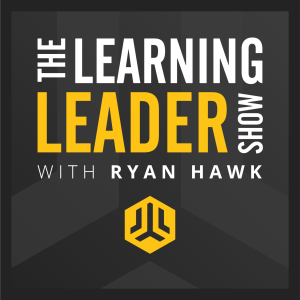
The Learning Leader Show With Ryan Hawk
Business:Management

481: Eric Barker - The Surprising Science About Building Excellent Relationships (Plays Well With Others)
 2022-07-17
2022-07-17
Text Hawk to 66866 to become part of "Mindful Monday." Receive a carefully curated email from me each Monday morning to help you start your week off right...
Full show notes at www.LearningLeader.com
Twitter/IG: @RyanHawk12 https://twitter.com/RyanHawk12
Eric Barker is the author of The Wall Street Journal bestseller “Barking Up the Wrong Tree,” which has sold over half a million copies and been translated into 19 languages. It was even the subject of a question on “Jeopardy!” Over 500,000 people have subscribed to his weekly newsletter. His work has been covered by The New York Times, The Atlantic, The Financial Times, and others. Eric is also a sought-after speaker, having given talks at MIT, Yale, Google, the United States Military Central Command (CENTCOM), and the Olympic Training Center. His latest book is called “Plays Well with Others."
- Love – Casanova said, “love is three-quarters curiosity.” That curiosity creates deep knowledge… And that helps you build what researcher John Gottman calls, a “love map.” “Everyone asks how you got together; nobody asks how you stayed together. And it’s the latter that is often the real achievement to be proud of.”
- Your WHO: Take your health, for example. The Framingham study showed that drinking, smoking, and obesity are all quite contagious. If someone you consider a friend becomes obese, your likelihood of obesity increases by 53%. And if the friendship is mutual, the number rises to 171%.
- "Friends are only there because you want them to be."
- "Friends make us happier than any other relationship."
- How to build deeper relationships with friends?
- Time
- Be vulnerable -- "Relationships move at the speed of vulnerability."
- How to make your relationship with your partner better?
- Do exciting things together - Be proactive
- Leverage emotional contagion - Associate feelings with events
- Bill Perkins - "Create memory dividends."
- You need to learn and grow together
- John Gottman asks couples to tell their stories...
- The ones that stick together celebrate the difficulties
- Profiling - “Humans are prone to seeing meaning when there is none.” There’s a fundamental reason that astrologers outnumber astronomers. Emotionally we want a feeling of control over the world around us. We desperately need the world to at least seem to make sense. And for that, we need a story, even if it isn’t true.
- Confirmation bias: what is it? And what are the 3 ways to resist it?
- Feel accountable
- Distance before decision
- Consider the opposite
- Lying — how can you spot a liar? The average college student lies in about a third of conversations. For adults, it’s 1 in 5. In online dating, 81% of profiles deviate from the truth. And we are terrible at detecting lies, averaging a 54% success rate.
- So how do we become better at understanding if someone is lying? This system takes patience (so it isn’t useful for little lies but can be powerful for bigger issues). “The science overwhelming recommended a nuanced and sophisticated method humans have never tried in the past 5,000 years when attempting to detect lies: being nice. Never be a bad cop, be a friendly journalist. You have to get them to like you. To open up. To talk a lot. And to make a mistake that reveals deception. Don’t accuse. Be curious.
- Optimism – Shawn Achor’s Ted Talk (so funny and fast). MET Life saw such great results among happy salespeople that they tried an experiment: they started hiring people based on optimism. It turns out that the optimistic group outsold their more pessimistic counterparts by 19% in year one and 57% in year two.
- "Writing a book is like telling a joke and having to wait two years to know whether or not it was funny." —ALAIN DE BOTTON
- Eric writes to start his new book... Henry Thomas Buckle once said: “Great minds discuss ideas; average minds discuss events; small minds discuss people.” I’m here to discuss people.
- Leveraging the best evidence available—free of platitudes or magical thinking—Eric analyzes multiple sides of an issue before rendering his verdict. What he’s uncovered is surprising, counterintuitive, and timely—and will change the way you interact in the world and with those around you just when you need it most.
- Life/Career advice:
- Set your personal definition of success
- "You need to be able to say this is enough."
- Set your personal definition of success
More Episodes
Create your
podcast in
minutes
- Full-featured podcast site
- Unlimited storage and bandwidth
- Comprehensive podcast stats
- Distribute to Apple Podcasts, Spotify, and more
- Make money with your podcast
It is Free
- Privacy Policy
- Cookie Policy
- Terms of Use
- Consent Preferences
- Copyright © 2015-2024 Podbean.com





